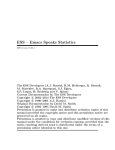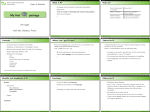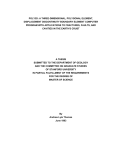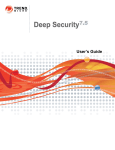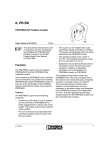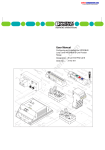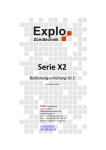Download 1 General Information: README
Transcript
1 General Information: README This is the README file for the distribution of ESS version 15.03-1 ESS is a GNU Emacs and XEmacs mode for interactive statistical programming and data analysis. Languages supported: the S family (S, S-PLUS and R), SAS, BUGS/JAGS and Stata. ESS grew out of the desire for bug fixes and extensions to S-mode and SAS-mode as well as a consistent union of their features in one package. Installation instructions are provided in sections for both Unix and Windows; see below. The current development team is led by Martin Maechler since August 2004. Former project leader A.J. (Tony) Rossini ([email protected]) did the initial port to XEmacs and has been the primary coder. Martin Maechler ([email protected]) and Kurt Hornik ([email protected]) have assisted with the S family and XLispStat. Stephen Eglen ([email protected]) has worked mostly on R support. Richard M. Heiberger ([email protected]) has assisted with S/S-PLUS development for Windows. Richard and Rodney A. Sparapani ([email protected]) have done much of the work improving SAS batch and interactive support. Rodney has also extended ESS to support BUGS/JAGS and has an interest in improving Stata support. We are grateful to the previous developers of S-mode (Doug Bates, Ed Kademan, Frank Ritter, David M. Smith), SAS-mode (Tom Cook) and Stata-mode (Thomas Lumley). 1.1 License The source and documentation of ESS is free software. You can redistribute it and/or modify it under the terms of the GNU General Public License as published by the Free Software Foundation; either version 2, or (at your option) any later version. ESS is distributed in the hope that it will be useful, but WITHOUT ANY WARRANTY; without even the implied warranty of MERCHANTABILITY or FITNESS FOR A PARTICULAR PURPOSE. See the GNU General Public License in the file COPYING in the same directory as this file for more details. 1.2 Stability All recent released versions are meant to be release-quality versions. While some new features are being introduced, we are cleaning up and improving the interface. We know that there are many remaining opportunities for documentation improvements, but all contributors are volunteers and time is precious. Patches or suggested fixes with bug reports are much appreciated! 1.3 Requirements ESS is most likely to work with current/recent versions of the following statistical packages: R/S-PLUS, SAS, Stata, OpenBUGS and JAGS. ESS supports current, and recent, stable versions of GNU Emacs (currently, specifically, the 23.x and 24.x series; alpha/beta/pre-release versions are NOT SUPPORTED). NonWindows users beware: GNU Emacs 24.3 is preferable to 24.1 or 24.2: these broken builds suffer from bug 12463 http://debbugs.gnu.org/cgi/bugreport.cgi?bug=12463 which will cause emacs and ESS to get progressively slower over time. Due to XEmacs lacking some features that ESS requires, ESS support of XEmacs ends with ESS 12.04-4. This decision will be re-visited in the future as XEmacs continues to sync with GNU Emacs. To build the PDF documentation, you will need a version of TeX Live or texinfo that includes texi2dvi (BEWARE: recent TeX Live, and some texinfo RPMs, do NOT include texi2dvi). 1.4 Getting the Latest Version The latest released version of ESS is always available on the web at: ESS web page or StatLib 1.4.1 Git for ESS development For development and experimentation on new ESS features, there is now a GitHub branch for ESS, available at https://github.com/emacs-ess/ESS. 1.5 Installation 1. Download the latest zip or tgz archive from ESS downloads area and unpack it into a directory where you would like ESS to reside. We will denote this directory as /path/to/ESS/ hereafter. Alternatively you can use git to fetch the most recent development version to your local machine with: git clone https://github.com/emacs-ess/ESS.git /path/to/ESS 2. Optionally, compile elisp files and build the documentation with: cd /path/to/ESS/ make Without this step, info, pdf and html documentation and reference card will not be available. 3. Optionally, install into your local machine with make install. You might need administrative privileges: make install The files are installed into /usr/share/emacs directory. For this step to run correctly on Mac OS X, you will need to adjust the PREFIX path in Makeconf. The necessary code and instructions are commented in that file. 4. If you have performed the make install step from above, just add (require ’ess-site) to your ~/.emacs file. Otherwise, you should add /path/to/ESS/lisp/ to your emacs load path and then load ESS with the following lines in your ~/.emacs: (add-to-list ’load-path "/path/to/ESS/lisp/") (load "ess-site") 5. Restart your Emacs and check that ESS was loaded from a correct location with M-x ess-version. Note for Windows and Mac OS X users: The most straightforward way to install Emacs on your machine is by downloading all-in-one Emacs binary by Vincent Goulet. Note for XEmacs users: Due to XEmacs lacking some features that ESS requires, ESS support of XEmacs ends with ESS 12.04-4. This decision will be re-visited in the future as XEmacs continues to sync with GNU Emacs. 1.6 Starting an ESS process To start an S session on Unix or on Windows when you use the Cygwin bash shell, simply type M-x S RET. To start an S session on Windows when you use the MSDOS prompt shell, simply type M-x S+6-msdos RET. 1.7 Current Features • Languages Supported: • S family (R and S+ AKA S-PLUS) • SAS • OpenBUGS/JAGS • Stata • Julia • Editing source code (S family, SAS, OpenBUGS/JAGS, Stata, Julia) • Syntactic indentation and highlighting of source code • Partial evaluation of code • Loading and error-checking of code • Source code revision maintenance • Batch execution (SAS, OpenBUGS/JAGS) • Use of imenu to provide links to appropriate functions • Interacting with the process (S family, SAS, Stata, Julia) • Command-line editing • Searchable Command history • Command-line completion of S family object names and file names • Quick access to object lists and search lists • Transcript recording • Interface to the help system • Transcript manipulation (S family, Stata) • Recording and saving transcript files • Manipulating and editing saved transcripts • Re-evaluating commands from transcript files • Interaction with Help Pages and other Documentation (R) • Fast Navigation • Sending Examples to running ESS process. • Fast Transfer to Further Help Pages • Help File Editing (R) • Syntactic indentation and highlighting of source code. • Sending Examples to running ESS process. • Previewing 1.8 New Features Changes and New Features in 15.03-1: • ESS[R]: An indentation bug has been fixed (github issue 163) • ESS[R]: On windows, if ‘ess-prefer-higher-bit’ is non-nil (the default), then R-newest will try to run a 64 bit (rather than 32 bit) version of R. Changes and New Features in 15.03: • ESS[R]: Full native support for ‘company-mode‘. • ESS[R]: More efficient caching algorithm for R completion. • ESS: New offset variable ‘ess-close-paren-offset‘ to control the indentation of the closing parentheses. • ESS[R]: Ask for CRAN mirror only once per emacs session. • ESS[R]: Detect library and require calls for better completion caching. • Buffer display is now customizable (ess-show-buffer-action). • Use y-or-n-p instead of yes-or-no-p throughout. • More support for ODS in ess-sas-graph-view. • Makefiles are now both UNIX and GNU friendly. • ESS[R]: Simplify directory lookup in ess-developer (#137). • Make closed paren indentation consistent Bug Fixes in 15.03: • Fix open brace indentation bug (#27 in ess/R-ESS-bugs.R). • Fix git version lookup • Don’t check directory modtime in R dialect. • Declare all ess macros for edebug. • Add ess-smart-comma to eldoc message functions. • Inform users when retrieving RDA aliases. • Line ending in ’~’ is also a continuation line. • Filing roxy paragraphs works as expected now. • In ess-developer-add-package, remove incorrect ‘wait‘ argument from ess-getwords-from-vector call. • Fix #96, #117, #120, #125, #134, #137. • Fix ess-quit-r. Call base::q() even if it is masked. • Fix ‘ess-show-buffer‘ to always display the buffer in another window. • Makefile: Fix cd bug for directories with spaces in them • ess-kill-buffer-and-go modified to not restart R Changes / Selected Bug Fixes in 14.09: • ESS[Julia]: Executable is changed to julia. • ESS[Julia]: Completion and help system was adjusted to Julia v.0.3.0. Julia v.0.2.x is no more supported. • ESS[R]: Running R with gdb debugger now works as expected • iESS: Inferior ESS buffers are now derived from comint-mode • ESS[R]: ess-execute-screen-options uses correct screen width in terminal sessions • ESS: ess-build-tags-for-directory works when no TAGS file name was provided • ESS: ess-continued-statement-offset is now respected everywhere except inside of the if test condition. • ESS: New variable ess-first-continued-statement-offset for indentation of the first line in multiline statements. • ESSR: Starting , in multiline statements indentation is now ignored to achieve a more pleasant alignment. • ESSR: Improved behavior of RET in roxygen blocks. • ESS[R]: command cleaning with C-u C-u C-y was broken with lines containing " + " • ESS[R]: fixed "empty watch window bug" • ESS[R]: don’t ask for help location on ac-quick-help (request of github #81) • ESS[R]: "importClassesFrom" and "importMethodsFrom" were added to the list of two-parameter roxygen commands • ESS[R]: fix vignetes display and hyperlinks (were broken in 13.09-1) • ESS[Julia]: recognize function names ending with ! • ESS[Julia]: fix indentation of "for" comprehension syntax within brackets. Changes / Selected Bug Fixes in 13.09-1: • ess-remote and TRAMP: R support code is now downloaded in binary form instead of being injected from local machine. The R code is stored in ~/.config/ESSR/ directory on the remote machine • TRAMP: PAGER environment variable is now correctly set to inferior-ess-pager • retrieval of help topics on remote machines is fixed • org-babel: source references of R code executed from org files correctly point to source references in original org files (version 8.2.1 or higher of org-mode is required for this feature) • ess-execute is now bound to C-c C-e C-e in ess-extra-map. • completion works again in ess-execute • ESS[R]: head and tail methods were replaced by htsummary in ess-R-describeobject-at-point-commands • ESS[roxygen]: evaluation commands now work in roxygen blocks. Leading comments are automatically removed before the evaluation • ESS[transcript]: ’Clean Region’ now works with multiline statements; ess-transcriptclean-region etc. correctly treat multiline statements, i.e., no longer forgets the lines typically preceded by ’+’ • ESS[SAS]: Three features/fixes with special thanks to Matthew Fidler https://github.com/emacs-ess/ESS/pulls/mlf176f2. Turn on SAS log mode when appropriate. Indent comments and CARDS statement more appropriately. • ESS[SAS]: ess-sas-edit-keys-toggle default returns to nil • ESS[R]: support for prettify-symbols-mode: contribution from Rudiger Sonderfeld https://github.com/emacs-ess/ESS/pull/65 • ESS[SWV]: knitr now evaluates in the current frame • ESS[developer]: ess-developer doesn’t kill open DESCRIPTION files anymore • ESS[roxygen]: ess-roxy-preview-HTML is now on C-c C-o C-w and ess-roxypreview-text is now on C-c C-o C-t • ESS: installation with make install was simplified and should work out of the box on most *nix systems • ESS installation instructions simplified • fixed font-lock bug introduced in 13.09 that was causing very slow process output Changes/New Features in 13.09: • font-lock in process buffers doesn’t "spill" over prompts. Missing closing string delimiters should not cause wrong fontification of the following command input. • ESS[julia]: full features M-TAB completion and auto-complete support, which now works for modules, structures and data types. • ESS[julia]: a much better eldoc showing arguments of methods and data type constructors • ESS-developer: − ESS-developer work-flow pattern has been streamlined: ESS-developer is now automatically activated on per-file basis if the file is part of a developed package ess-developer-packages. The old behavior (activation on per-process basis) is still available on M-x ess-developer in a process buffer. − integration with devtools package. New command ess-developerload-package calls load_all on the package containing current file. ess-developer-add-package now offers IDO menu completions with available loading methods, currently library, and load_all. Loading command can be customized with ess-developer-load-on-add-commands. • TAB now indents region if region is active (a contribution of Matthew Fidler in pull #41) • M-x ess-version now reports full loading path and recognizes git and ELPA versions. • warning and error keyword are now highlighted with font-lock-warning-face as they should be, (for quite some time these keywords have been hijacked by compilation mode fontification). • eldoc: Eldoc now recognizes multiple processes. If current process is busy, or current buffer is not associated with a process, eldoc picks its completions from the first available free process. • org-babel: evaluation is now org-friendly • help: new help buffers now try to reuse ess-help buffers. This behavior is controlled by ess-help-reuse-window custom variable. • help: ?foo pops IDO menu on multiple help files (so far it worked only for C-c C-v) • remote evaluation is considerably faster now on slow connections • ESS[R] tracebug R source references regular expressions are (mostly) language agnostic. • ess-function-call-face inherits from font-lock-function-name-face rather than font-lock-builtin-face. • ess-inject-source now accepts function-and-buffer option. • Documentation: The “New Features” section (and NEWS) now represent recent changes: within the last year or so. All changes can be found in the new news.html (or NEWS and ONEWS). • ESS[R] ess-rep-regexp should no longer inf.loop (rarely!), and hence M-x ess-fixmiscellaneous should neither. Changes/New Features in 13.05: • ESS[gretl]: Support for gretl (both editing and sub-process interaction). A contribution of Ahmadou Dicko. • ESS: process output display is 4-10 times faster due to new caching and only occasional emacs re-display (for the moment this functionality is available only when ess-tracebug is active). • ESS: C-c ‘ is now bound to ess-show-traceback and C-c ~ is bound to ess-showcall-stack. • ESS[R]: ESS stores function in ’ESSR’ environment to avoid kludging users’ global environment and accidental deletion. • ESS[R]: new variable ess-swv-processing-command to control weaving and tangling. • ESS[R]: ess-default-style has been changed (from DEFAULT) to RRR. Use something like (setq ess-default-style ’DEFAULT) or (setq ess-indent-level 2) in your ~/.emacs equivalent before loading ESS, if you do not like this new “incompatible” default style. • ESS[julia]: ESS stores its functions in ’ESS’ module. • ESS[julia]: Eldoc is now supported in julia modes • ESS[julia]: Adjusted error reference detection and interactive help to julia internal changes • ESS[R]: ess-use-tracebug’s default has been changed to t. Set it to nil if you want to keep the previous behavior. • ESS[tracebug]: Electric debug keys have been removed [breaking change] The functionality was replaced with ess-debug-minor-mode and ess-debug-minor-mode-map. • ESS[tracebug]: ess-tracebug-map is an alias to ess-dev-map C-c C-t. • ESS[tracebug]: ess-bp-toggle-state (C-c C-t o) can now be used during the debug session to toggle breakpoints on the fly (suggestion by Ross Boylan). • ESS[tracebug]: ess-debug-flag-for-debugging and ess-debug-unflag-fordebugging work correctly from the debugging contexts. These commands also recognize non-exported functions for the packages listed in ess-developer-packages (C-c C-t C-a). • ESS[R]: Eldoc (activated by ess-use-eldoc) has become more sophisticated, and hence also more intruding in the interface between the Statistics softare, e.g., R, and the user. Note that you can turn off ElDoc, by placing (setq ess-use-eldoc nil) in your ~/.emacs file, prior to loading ESS, • ESS[SAS]: long over-looked SAS-mode-hook appears! • ESS[SAS]: ess-sas-edit-keys-toggle now defaults to t since sas-indent-line is still broken, i.e. TAB is now bound to ess-sas-tab-to-tab-stop by default Changes/Bug Fixes in 12.09-2: • ESS: new ess-switch-to-end-of-proc-buffer variable that controls whether C-c Cz switches to the end of process buffer. The default is t. You can use prefix argument to C-c C-z to toggle this variable. • ESS: fix in ess-eval-linewise that was causing emacs to hang during R debugging with ess-eval-visibly equal to t. • ESS: fix in ess-eval-linewise that was causing emacs to recenter the prompt in visible window • ESS[tracebug]: A better handling of “Selection” prompts and debug related singlekey commands. • ESS: fix a bug in ess-switch-process that was causing *new* selection to fail. • ESS[R]: Solve missing ess-local-process-name bug in R-dired. • ESS[SWV]: ess-swv-PDF doesn’t ask for a command to run if there is only one command in ess-swv-pdflatex-commands. • ESS[SWV]: ess-swv-weave gained an universal argument to allow for an interactive choice between available weavers (sweave, knitr). • ESS: ess-eval-*-and-step functions go to next empty line at eob, instead of staying at the last line. Changes/New Features in 12.09-1: • ESS Breaking Changes in Keys: − New keymaps: ess-doc-map bound to C-c C-d; ess-extra-map bound to C-c C-e; ess-dump-object-into-edit-buffer was moved on C-c C-e C-d − roxygen map was moved on C-c C-o and ess-roxy-update-entry now resides on C-c C-o C-o − ess-handy-commands is not bound anymore − ess-dev-map (including ess-tracebug and ess-developer) moved on C-c C-t − C-c C-y is deprecated in favor of C-c C-z C-z • ESS[R] new command ess-describe-object-at-point bound to C-c C-d C-e (repeat C-e or e to cycle). It was inspired by Erik Iverson’s ess-R-object-tooltip. Customize ess-describe-at-point-method to use tooltip instead of an electric buffer. • ESS: New command ess-build-tags-for-directory bound to C-c C-e C-t for building dialect specific tag tables. After building tags use M-. to navigate to function and objects definitions. By default C-c C-e C-t builds tags based on imenu regular expressions and also include other common languages .c, .o, .cpp etc. But it relies on external find and etags commands. If ess-build-tags-command is defined (for R), the inferior process is asked to build tags instead. • ESS: ess-switch-process offers *new* alternative to start a new process instead of switching to one of the currently running processes. • ESS: Switching between processes (C-c C-s) uses buffer names instead of the internal process names. Use M-x rename-buffer command to conveniently rename your process buffers. • ESS: Process buffers can be automatically named on process creation according to user specified scheme. Default schemes are *proc*, *proc:dir* and *proc:abbr-long-dir* where proc stands for the internal process name and dir stands for the directory where the process was started in. The default is *proc*. For customization see ess-gen-procbuffer-name-function. • ESS: ess-eval-visibly-p is deprecated in favor of ess-eval-visibly. • ESS: New evaluation pattern nowait. In addition to old nil and t values, ess-evalvisibly accepts nowait for a visible evaluation with no waiting for the process. See ess-eval-visibly for details on evaluation patterns. • ESS: New “Process” menu entry with process related commands and configuration • iESS: Process buffer is now automatically shown on errors • ESS: New ess-switch-to-inferior-or-script-buffer command bound to C-c C-z in both script and process buffers. If invoked form process buffer it switches to the most recent buffer of the same dialect. It is a single key command. • ESSR-help: On multiple help pages with the same name, C-c C-v now asks for user resolution directly in emacs. • ESS[R] ess-roxy: new variable ess-roxy-re for fontification of cases where the number of leading # differs from ess-roxy-str. • ESS[R] Eldoc was considerably enhanced. It now finds hidden default S3 methods and displays non-default methods’ arguments after trailing ||. • ESS[R]: New ess-display-demos command bound to C-c C-d o and C-c C-d C-o • ESS: New ess-help-web-search command bound to C-c C-d w and C-c C-d C-w to facilitate interactive search of web resources. Implemented for R, Stata and Julia. See also ess-help-web-search-command. • ESS: ess-pdf-viewer-pref accepts now command line arguments • ESS[Rnw]: Add knitr support. Customize ess-swv-processor for the default processor. • ESS[Rnw]: More thorough renaming of remaining noweb-* to ess-noweb-*. • ESS[Rnw] new commands ess-eval-chunk-and-step and ess-eval-chunk bound to M-n C-c and M-n C-M-x to mirror standard ess commands in C-c map. • ESS[R] Auto-completion: new variable ess-ac-R-argument-suffix to customize the insertion of trailing "=". Defaults to “ = “. • ESS[Julia]: Added index, apropos and web-search to julia. • ESS help: More evaluation commands were added to ess-help mode (C-c C-c, C-M-x etc) Bug Fixes in 12.09-1: • iESShelp: Multiple help pages with the same name are properly handled on C-c C-v • iESSremote: Evaluation with ESS remote no longer freezes emacs. • iESS: comint-previous-prompt C-c C-p no longer stops on secondary prompt “+”. • iESS[R], iESS(Sqpe) [S] on Windows: The options("editor") is now initialized to emacsclient instead of the previous gnuclient. The user may need to add the line (server-start) to the emacs initialization file. emacsclient has been included with emacs since GNU Emacs 22.1. • ESS[Rnw] Fixed “connection to R” bug (in 12.09 only). • ESS[Rnw] Explicit ess-swv-stangle and ess-swv-sweave functions. • ESS[Rnw] Fixed completion and smart underscore problems cause by unmatched “\”’ • ESS[R] is more careful with the R code injection. It now happens only once at the start of the session. • ESS[R]: Fixed auto-scrolling the comint buffer on evaluation. • ESS[Julia]: Solve several indentation and word navigation problems. • ESS[Julia]: Help system works again. Changes/New Features in 12.09: • Due to XEmacs lacking some features that ESS requires, ESS support of XEmacs ends with ESS 12.04-4. This decision will be re-visited in the future as XEmacs continues to sync with GNU Emacs. • ESS[R]: On Windows, there is now a new customizable variable (currently called ess-directory-containing-R) to tell ESS where to look for the Rterm.exe executables. The name of the variable and the values it can take are both in beta and subject to change. Prior to this variable, ESS searched only in the default installation directory. Setting this variable now tells ESS how to find Rterm.exe executables when they are installed somewhere else. • ESS[julia]: new mode for editing julia code (*.jl). Start with M-x julia. Full interaction interface, imenu and basic error referencing are available. • ESS[R] noweb: noweb-mode and noweb-font-lock-mode have been renamed to ess-noweb-mode and ess-noweb-font-lock-mode to avoid conflicts with the “real” noweb-mode. • ESS[R] noweb: The long standing font-lock bug has been solved in ess-noweb interface. • ESS: Basic evaluation keys are now bound to ess-eval-region-*- functions: − C-M-x is bound to ess-eval-region-or-function-or-paragraph − C-c C-c is bound to ess-eval-region-or-function-or-paragraph-and-step − C-RET is bound to ess-eval-region-or-line-and-step Each of these functions first evaluates the region whenever the region is active. • ESS: C-M-a/C-M-e now step to beginning/end of paragraph if no function has been detected. • ESS: ess-eval-*-and-step family of functions are now smarter, and don’t step to end of buffer or end of chunk code (@) when at the end of the code. • ESS: ess-handy-commands function is bound to C-c h • ESS: ESS is now blinking the evaluated region. Set ess-blink-region to nil to deactivate; ess-blink-delay gives the duration of the blink. Evaluated region is “blinked” in highlight face. • ESS[R-help] New key a for “apropos()” in help buffers. Also available through C-c h. • ESS[R-help] All R commands of type foo?bar and foo??bar are recognized and redirected into appropriate *ESS-help* buffers. • ESS[R]: New customization interface for font-lock. ESS font-lock operates with predefined keywords. Default keywords are listed in ess-Rfont-lock-keywords and inferior-R-font-lock-keywords, which see. The user can easily customize those by adding new keywords. These variables can also be interactively accessed and saved through ESS/Font-lock submenu. Several new fontification keywords have been added. Most notably the keywords for highlighting of function calls, numbers and operators. • ESS[R]: auto-complete is now activated by default whenever auto-complete package is detected. Set ess-use-auto-complete to nil to deactivate. • ESS[R]: R AC sources are no longer auto-starting at 0 characters but at the default ac-auto-start characters. • ESS no longer redefines default ac-sources, but only appends ac-source-filename to it. • ESS: ac-source-R now concatenates “ = “ to function arguments. • ESS: Menus for ESS and iESS have been reorganized and enriched with Tracebug and Developer submenus. • ESS[R]: ess-developer and ess-tracebug commands are available by default in ess-dev-map which is bound to C-c d in ESS and iESS maps. • ESS[R]: eldoc truncates long lines whenever eldoc-echo-area-use-multiline-p is non-nil (the default). Set this variable to t if you insist on multiline eldoc. See also ess-eldoc-abbreviation-style. • ESS[R]: completion code pre-caches arguments of heavy generics such as plot and print to eliminated the undesirable delay on first request. • iESS: Prompts in inferior buffers are now highlighted uniformly with comint-highlight-prompt face. • ESS[R]: R process no longer wait for the completion of input in inferior buffer. Thus, long running commands like Sys.sleep(5) no longer stall emacs. • ESS: [R, S, Stata, Julia] have specialized ess-X-post-run-hooks, which are run at the end of subprocess initialization. • ESS[Stata]: All interactive evaluation commands work as expected. On-line comments are removed before the evaluation and multiline comments are skipped on C-c C-c and other interactive commands. • ESS no longer auto-connects to a subprocess with a different dialect than the current buffer’s one. • ESS: ess-arg-function-offset-new-line is now a list for all the ESS indentation styles, which results in the following indentation after an open “(”: a <- some.function(other.function( arg1, arg2) • ESS[SAS]: Improved MS RTF support for GNU Emacs; try ess-sas-rtf-portrait and ess-sas-rtf-landscape. Changes/Bug Fixes in 12.04-3: • ESS: basic support for package.el compatibility • ESS[R]: correct indentation of & and | continuation lines • M-x ess-version shows the svn revision even after make install • ESS[SAS]: improved XEmacs support • iESS[R]: better finding of previous prompt • ESS[Stata]: adjusted prompt for mata mode • ESS[R]: resolved name clashes with cl.el • ESS[R]: removed dependence on obsolete package assoc • New make target lisp, to build the lisp-only part, i.e., not building the docs. Changes/New Features in 12.04-1: • iESS[Stata]: New interactive help invocation. • iESS[Stata]: New custom variable inferior-STA-start-file. • iESS[Stata]: inferior-STA-program-name is now “stata” and can be customized. • ESS[Stata] New sections in stata help files Syntax(s-S), Remarks(r), Title(t). Bug Fixes in 12.04-1: • ESS[R]: Better ess-tracebug error handling. • ESS[R]: Corrected ess-eldoc help string filtering and improved argument caching. • ESS[R]: Indentation of non-block if/else/for/while lines fixed. • M-x ess-version should work better. • ESS: Filename completion now again works inside strings. • iESS[Stata]: Fixed prompt detection issue. • ESS[Rd]: R is autostarted also from here, when needed. Changes/New Features in 12.04: • ESS: Reverting new behavior of 12.03, TAB in ess-mode no longer completes by default. If you want smart TAB completion in R and S scripts, similarly to iESS behavior, set the variable ess-tab-complete-in-script to t. Also see ess-first-tab-nevercomplete for how to customize where first TAB is allowed to complete. • ESS: completion is consistently bound to M-TAB (aka M-C-i) in both Emacs23 and Emacs24. • ESS: The variable ess-arg-function-offset-new-line introduced in ESS(12.03) now accepts a list with the first element a number to indicate that the offset should be computed from the indent of the previous line. For example setting it to ’(2) results in: a <- some.function( arg1, arg2) Changes/New Features in 12.03: • ESS indentation: new offset variable ess-arg-function-offset-new-line controlling for the indentation of lines immediately following open ’(’. This is useful to shift backwards function arguments after a long function call expression: a <- some.function( arg1, arg2) instead of the old a <- some.function( arg1, arg2) If ’(’ is not followed by new line the behavior is unchanged: a <- some.function(arg1, arg2) This variable should be set as part of indentation style lists, or in ess-mode hook. • ESS[R]: C-c . sets (indentation) style. • ESS: In ESS buffers yank(C-y) command accepts double argument C-u C-u to paste commands only. It deletes any lines not beginning with a prompt, and then removes the prompt from those lines that remain. Useful to paste code from emails, documentation, inferior ESS buffers or transcript files. • Documentation: ESS user manual has been rearranged and completed with several new chapters and sections to reflect newly added features (“Completion”, “Developing with ESS”, “ESS tracebug”, “ESS developer”, “ESS ElDoc”, “IDO Completion” and “Evaluating Code”) • RefCard: Reference card was updated to include new features. • Eldoc: Eldoc was rewritten and is activated by default. See ess-use-eldoc, ess-eldoc-show-on-symbol, ess-eldoc-abbreviation-style variables for how to change the default behavior. Note: skeleton-pair-insert-maybe prohibits eldoc display, on ( insertion. • ESS[R]: Eldoc shows arguments of a generic function whenever found. • ESS: TAB in ess-mode now indents and completes, if there is nothing to indent. Set ess-first-tab-never-completes-p to t to make TAB never complete on first invocation. Completion mechanism is similar to the completion in the inferior-ess-mode – a filename expansion is tried, if not found ESS completes the symbol by querying the process. • ESS for emacs version 24 or higher: ESS is fully compatible with the emacs 24 completion scheme, i.e. all the completion is done by completion-at-point. Also in accordance with emacs conventions, ESS doesn’t bind M-TAB for emacs 24 or higher. M-TAB calls the default complete-symbol. • ESS[R]: Out of the box integration with Auto Completion mode http://cx4a.org/software/auto-complete . Three AC sources ac-source-R-args, ac-source-R-objects and ac-source-R are provided. The last one combines the previous two and makes them play nicely together. Set ess-use-auto-complete to t to start using it. Refer to documentation string of ac-use-auto-complete for further information. • ESS[R]: New unified and fast argument completion system, comprised of ess-funname.start, ess-function-arguments, ess-get-object-at-point. Eldoc and auto-completion integration are using this system. • ESS: ess-switch-to-end-of-ESS(C-c C-z), and ess-switch-to-ESS(C-c C-y): Automatically start the process whenever needed. • ESS[R]: roxy knows about previewing text version of the documentation. Bound to C-c C-e t. • ESS[R]: Solved the “nil filename” bug in roxygen support. • ESS[R]: ess-tracebug is now part of ESS: New Features: − Source injection: Tracebug now can inject source references on the fly during code evaluation, i.e. you don’t have to source your file, but just evaluate your code in normal fashion. Variable ess-tracebug-inject-source-p controls this behavior - if t, always inject source reference, if ’function, inject only for functions (this is the default), if nil, never inject. During the source injection the value of ess-eval-visibly is ignored. − Org-mode support: Visual debugger is now aware of the temporary org source editing buffer (C-c ’) and jumps through this buffers if still alive, or in original org buffer otherwise. − New keys in watch mode: ? and d − Two new hooks: ess-tracebug-enter-hook and ess-tracebug-exit-hook • ESS[R]: New package ess-developer to evaluate R code directly in the package environment and namespace. It can be toggled on and off with C-c d t. When ess-developer is on all ESS evaluation commands are redefined to evaluate code in appropriate environments. Add package names to the list of your development packages with C-d a, and remove with C-d r. Source the current file with C-d s.Evaluation function which depend on ‘ess-eval-region’ ask for the package to source the code into, ess-evalfunction and alternatives search for the function name in the development packages’ environment and namespace and insert the definition accordingly. See the documentation section “Developing with ESS/ESS developer” for more details. • ESS[R] help system: New Features: − q quits window instead of calling ess-switch-to-end-of-ESS. This is consistent with emacs behavior help and other special buffers (breaking change). − k kills window without asking for the name (pointed by Sam Steingold) − Help map inherits from special-mode-map as sugested by Sam Steingold. − Package index: new function ess-display-index bound to i in help mode map. − Package vignettes: new function ess-display-vignettes bound to v in help mode map. − Display help in HTML browser: new function ess-display-help-in-browser bound to w in help mode map. It depends on R’s browser option. − New custom variable ess-help-pop-to-buffer: if non-nil ESS help buffers are given focus on display. The default is t (breaking change). − New menu entries for the above functions. − Bogus help buffers are no longer generated by default, i.e. buffers of the form “No documentation for ’foo’ in specified packages and libraries: you could try ’ ??foo’ ”. ess-help-kill-bogus-buffers now defaults to t. Beware, there may be instances where the default is unsatisfactory such as debugging and/or during R development. Thanks to Ross Boylan for making the suggestion, Sam Steingold for reminding us of this variable and Martin Maechler for the warning. • ESS now uses IDO completing read functionality for all the interactive requests. It uses ido completion mechanism whenever available, and falls back on classical completingread otherwise. You can set ess-use-ido to nil if you don’t want the IDO completion. See the documentation string of ess-use-ido for more information about IDO and ESS configuration. • ESS[S]: “,“ is bound to ess-smart-comma: If comma is invoked at the process marker of an ESS inferior buffer, request and execute a command from ‘ess-handy-commands’ list. If ess-R-smart-operators is t ‘ess-smart-comma also inserts “ “ after comma. • ESS[S], notably R: Variable ‘ess-handy-commands’ stores an alist of useful commands which are called by ess-smart-comma in the inferior buffer. Currently containing: change-directory ess-change-directory help-index ess-display-index help-object ess-display-help-on-object vignettes ess-display-vignettes objects[ls] ess-execute-objects search ess-execute-search set-width ess-execute-screen-options install.packages ess-install.packages library ess-library setRepos ess-setRepositories sos ess-sos Handy commands: ess-library, ess-install.packages, etc - ask for item with completion and execute the correspond command. ess-sos is a interface to findFn function in package sos. If package sos is not found, ask user for interactive install. • ESS: New dynamic mode line indicator: Process status is automatically reflected in all mode-lines of associated with the process buffers. Particularly useful for displaying debug status of ess-tracebug and developer status of ess-developer in all associated buffers. • ESS: New ess-completing-read mechanism: ESS uses ido completions whenever possible. Variable ess-use-ido controls whether to use ido completion or not. Active by default. • ESS now supports comint fields for output and input detection. This feature is not used by default, but might be useful in the future. • ESS[S]: New custom variable inferior-ess-S-prompt to customize prompt detection regular expression in the inferior ESS buffers. You can customize this variable to enhance comint navigation (comint-previous-prompt and comint-next-prompt) the inferior buffers. • ESS[R]: Internal R completion retrieval (ess-R-complete-object-name) was rewritten and is faster now. • ESS is using process plist to store process specific variables, as opposed to buffer local variables as it was using before. The use of buffer local variables to store process variables is discouraged. • ESS: new functions to manipulate process plists: ess-process-get and ess-processset. • ESS: Internal process waiting mechanism was completely rewritten. ESS no more relies on prompt regular expressions for the prompt detection. The only requirement on the primary process prompt is to end in > . This could be overwritten by setting inferor-ess-primary-prompt. • ESS[S], notably R: Saved command history: ess-history-file now accepts t (default), nil, or a file name. By setting it to nil no command line history is saved anymore. ess-history-directory now allows to have the history all saved in one “central” file. • ESS[R]: more Roxygen improvements. • ESS[R]: C-c . to set (indentation) style. • ESS[R]: Functions with non-standard names (for example ’aaa-bbb:cc’) are properly handled by font-lock and evaluation routines. • ESS[R]:Several regexp bugs (described in etc/R-ESS-bugs.el) were fixed in ess-getwords-from-vector and ess-command. 1.9 Reporting Bugs Please send bug reports, suggestions etc. to [email protected] The easiest way to do this is within Emacs by typing M-x ess-submit-bug-report This also gives the maintainers valuable information about your installation which may help us to identify or even fix the bug. If Emacs reports an error, backtraces can help us debug the problem. Type "M-x setvariable RET debug-on-error RET t RET". Then run the command that causes the error and you should see a *Backtrace* buffer containing debug information; send us that buffer. Note that comments, suggestions, words of praise and large cash donations are also more than welcome. 1.10 Mailing Lists There is a mailing list for discussions and announcements relating to ESS. Join the list by sending an e-mail with "subscribe ess-help" (or "help") in the body to [email protected]; contributions to the list may be mailed to [email protected]. Rest assured, this is a fairly low-volume mailing list. The purposes of the mailing list include • helping users of ESS to get along with it. • discussing aspects of using ESS on Emacs and XEmacs. • suggestions for improvements. • announcements of new releases of ESS. • posting small patches to ESS. 1.11 Authors • • • • • • • • • A.J. Rossini Richard M. Heiberger Kurt Hornik Martin Maechler Rodney A. Sparapani Stephen Eglen Sebastian P. Luque Henning Redestig Vitalie Spinu

















